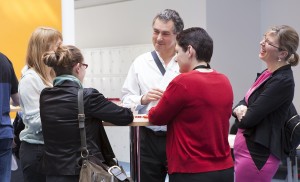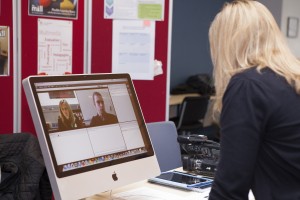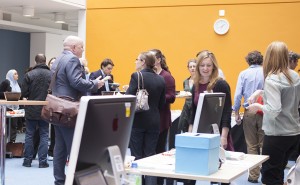On 7th May 2014, the Cass Business School held its fourth annual Teaching and Learning Showcase. Themed on excellence in teaching and learning, it featured inspiring talks from Cass lecturers, as well as colleagues from other Schools at City University London.
The showcase was jointly organised by key members of the Cass Teaching and Learning Committee, including the Associate Dean for Education, Dr Lorenzo Trapani, and colleagues from the department of Learning Enhancement and Development (LEaD) – notably Jo Richardson, Simon Kemp, Mo Pamplin and myself. Presentations took place across the day, with a lunchtime event where the three main sub-teams of the recently-formed LEaD ran stalls to inform staff and students about the services they offer (i.e. Student Counselling and Mental Health, Learning Success and Learning Development).
Excellence in…adapting to educational change
The showcase began with a welcome from the Dean of Cass Business School, Professor Steve Haberman, followed by an introduction to the day from Dr Trapani. Chief Executive of Cass Executive Education, Dr JoEllyn Prouty McLaren, gave an informative and fascinating talk on ‘The Art and Science of Executive Education’. Dr Prouty McLaren highlighted current trends in the learning and development industry in informing and guiding practice toward a more learner-centred model, focusing on the challenges and opportunities brought about by evolving technologies in delivering executive education online (e.g. with MOOCs – see below), and the behaviour, skill and mindset changes amongst the learners involved. Dr Prouty McLaren also described several key learning theories underpinning her practice, making reference to online communities of practice, situated learning and reflection in action, to name a few, as critical components for Executive Education programmes.

Excellence in…active learning and students as partners in learning
Dr Stephanie Feiereisen from the Faculty of Management at Cass demonstrated some of the active learning techniques that she used in her lectures, drawing on the experience and preconceptions of her students to make learning for them meaningful and relevant. I particularly liked how Dr Feiereisen made use of ‘feedback cards’ to collect written (and anonymous) feedback on her students’ understanding at the end of a class. These were not only useful for her but enabled her students to actively reflect on their learning. Dr Martin Rich also from the Faculty of Management discussed several Moodle-based projects where he and his students worked together, taking a collegiate approach to learning. Dr Rich described how his students had gone onto to take ownership of the projects, with him acting as a facilitator to their learning. One of the projects developed into using a Facebook group in order to create a critical mass. Dr Rich discussed the benefits of students choosing to use Facebook – the power of the ‘Like’ button, familiarity and user-friendliness on mobile devices to name a few.

Excellence in…assessment for learning
Dr Russell Gerrard, Associate Dean for the Undergraduate programme in the Faculty of Actuarial Science and Insurance, demonstrated his ‘workthrough’ program as an effective technique to help his students prepare for their summative actuarial exams. The advantages of this resource for the students are that it enables them to work at their own pace, with built-in hints to encourage and students can find out immediately if they have got the correct answer. If they haven’t, it is easy to walkback to the start and try again. Dr Robert Cowell, also from the Faculty of Actuarial Science and Insurance, described some recent additions to his ‘teaching toolbox’, which included a computer program for setting numerical questions in Moodle that allowed a greater degree of flexibility in the range of questions that he could set for his students’ coursework. And, along a similar to vein to that of Dr Gerrard, this resource meant that he and his students could see the process of working out the answer as a series of steps. Dr Cowell also described an interesting technique of generating animations within a PDF file – surprisingly this can be done provided that Adobe Acrobat is used to view the PDF files. Dr Cowell created animations in PDFs to demonstrate theoretical concepts such as linear regression for his students. He also demonstrated an audio-visual pdf animations created using the Livescribe Echopen system.

Excellence in…teaching with MOOCs and large-scale simulations
Professor Clive Holtham, from the Faculty of Management, gave a fascinating and highly informative critical analysis of ‘MOOCs’ in his talk entitled ‘MOOCs: threat or opportunity?’. In his talk he defined Massive Open Online Courses (MOOCs) and described several that he had participated in and evaluated. Professor Holtham further discussed Small Private Online Courses (SPOCs) which he feels are very attractive as they offer a highly personlised learning approach with small cohort numbers and they further generate revenue. Professor Holtham described a good example of a SPOC – ‘Rheingold University’ (by Howard Rheingold, offering courses in Executive Education). Toward the end of his talk Professor Holtham described future, parallel innovations to MOOCs – that of large-scale simulations for mass learning, referring to a simulation project that Cass Business School had carried out with their own ‘Millcaster Tales’ (the world’s first Management soap opera).

Excellence in…supporting the student experience of learning
Suzanne Griffiths, Electronic Resources Manager at Cass, gave an interesting discussion and demonstration of how business database skills are integrated into the student learning experience at Cass. Suzanne described how encouraging students to make use of business databases such as Bloomberg are essential for illustrating academic theory, developing research and current awareness skills and offer certification to enhance employability prospects. Suzanne referred to the work being carried out by Dr Nick Motson, Lecturer in Finance, who uses Bloomberg in the classroom to transform the way he teaches derivatives and allows him to bring the topic to life.
Dr Julia Browne, Senior Lecturer on the Bar Professional Training Course (BPTC) at The City Law School, gave an interesting talk on ‘The Orchestration of Excellence in Learning’, where she referred to the strategies she recently used to orchestrate an integrated, highly student-centred and structured BPTC. Dr Browne presented the results of student feedback which showed that students were very positive about the restructured BPTC, with students agreeing that it had helped them develop their written and advocacy skills, with one commenting how they had seen a dramatic difference in the quality of their assignments.

Dr Rachael-Anne Knight, Senior Lecturer in the Division of Language and Communication Science, discussed ‘what is excellent teaching, and how might we achieve it?’. Dr Knight discussed various ways in which we can ‘measure’ excellent teaching, and referred to a case-study whereby she had to redesign a module for undergraduates and the challenges that this posed in terms of the content, relevance to students (clinicians and non-clinicians), structure and the fact that every lecture was self-contained. Listening to Dr Knight’s experience of redesigning a module from the perspective of achieving excellence in teaching was very informative.
Dr Miguel Mera, Senior Lecturer in the Department of Music, gave a fascinating talk on the immediacy of theory and practice, explaining how immediacy as a concept reduces the physical / psychological distance in the student/teacher relationship. Dr Mera described how immediacy is achieved in the design and delivery of one of his modules, which was very entertaining and interesting to hear about. Dr Mera further argued for his teaching approach as one that on reflection is actually very effective in enabling immediacy both in content and delivery.
The last talk of the showcase was provided by Dr Arti Agrawal, Lecturer in Electrical and Electronic Engineering. Unlike the previous presenters, Dr Agrawal chose not to use a PowerPoint presentation because in her words “I don’t like competition…I want your attention, all of your attention”, this, and the fact that she likes to engage with her audience, is indicative of her teaching approach. In her talk, Dr Agrawal reflected on her journey developing as a lecturer, discussing the challenges (such as teaching to strategic learners, engaging students with difficult topics and extrinsic motivation) and how she has been able to overcome these. Dr Agrawal talked about a ‘top-down’ approach to learning, referring to the practice of Professor Eric Mazur at Harvard University, in inspiring her to motivate her students – excite students by starting with the big problems and questions first, rather than a bottom-up approach where learning is done in small stages to build up to solving the big problems.



Leave a Reply